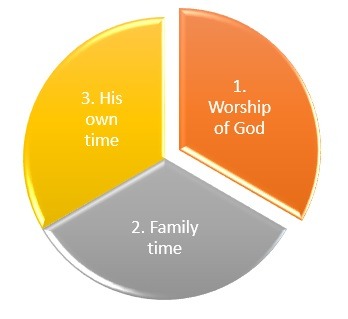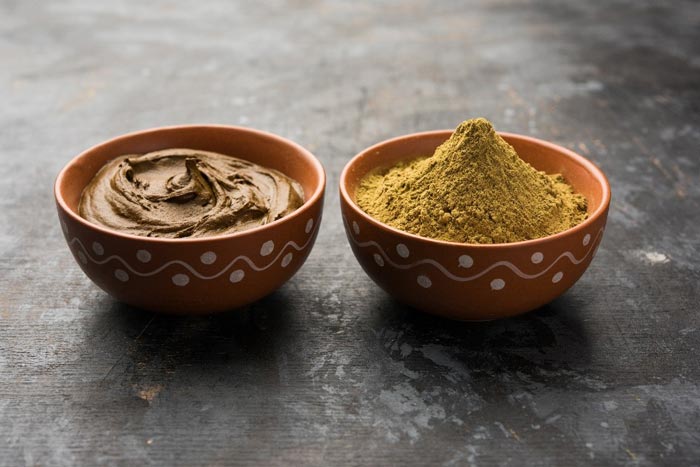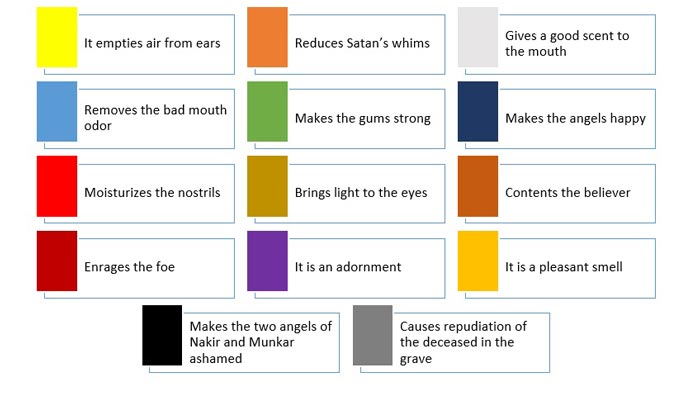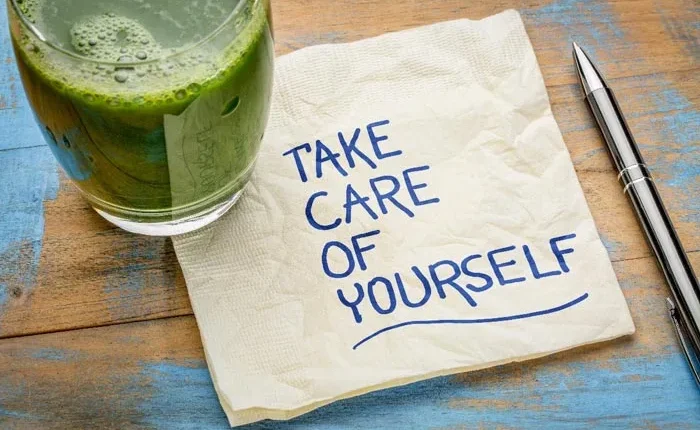Contents
The past few years of my life, I had been very busy with work, university, household chores, family, and all those other details that had kept me busy and eaten up my time. I had quit going to the gym because I was too busy with other things. When looking in the mirror, there was this sadness in my eyes. My skin didn’t look young and fresh, and I had a problem falling into a deep sleep at night as my mind was always busy with thoughts and future plans. I didn’t like this new me. The corona pandemic had made everything worse. Wearing a mask every time I wanted to go out, homeschooling my children, the lockdowns, not seeing my parents, and no more travel because of the restrictions had worsened my situation. I was missing something. Self-care.
Self-Care Came to My Rescue
I realized I had to help myself. What I had neglected for long was self-care. I needed to take care of my body and soul. So I researched to see if the teachings of the Prophet (S) had a practical remedy for my pain. And guess what?! I found it.
In this article, I will share some of the tips I learned from the self-care techniques practiced by Prophet Muhammad (S) and his family that improved my life.
1. Start Your Self-Care Journey by Daily Time Management

The first key in self-care is to mindfully manage your time.
Our problem is that we often get so dissolved in one activity, such as our job, which distracts our attention from other valuable things like family, friends, God, and ourselves.
The Noble Quran makes a beautiful statement about time management:
فَإِذَا قُضِيَتِ الصَّلَاةُ فَانْتَشِرُوا فِي الْأَرْضِ وَابْتَغُوا مِنْ فَضْلِ اللَّهِ وَاذْكُرُوا اللَّهَ كَثِيرًا لَعَلَّكُمْ تُفْلِحُونَ
And when the prayer is finished disperse through the land and seek Allah’s grace, and remember Allah much so that you may be felicitous.1
Your priority is to be given to the worship of God, leading your life based on God’s satisfaction, and being mindful of the material and eternal worlds.
Amid your work, when it is praying time, stop all that you are doing, pray first, then go back to your business or what you were doing.
Self-Care and Time Management of Prophet Muhammad (S)
Prophet Muhammad’s grandson, Hussain bin Ali (AS), says,
I asked my father, Ali (AS), how the prophet divided his time at home. He said, ‘When he got home, he divided his time into three parts:
- One part he devoted to the worship of God
- One part for his family
- One part for himself2

Don’t put all your time and energy into your work. Self-care involves taking all aspects of your life into consideration.
2. Self-Care and Mindfulness
Self-care is not merely taking care of your body by eating well and exercising. Self-care also entails taking care of your mind and soul.
Being mindful of your relationship with God at all times and during all your activities gives you a sense of peace as you know that you have a protector as mighty and merciful as God. Hence, you would direct all your attention and activities in line with His satisfaction. A beautiful exemplification of a mindful individual is Prophet Muhammad (S).
Be Mindful Even in Your Business
Self-care is not just grabbing a glass of fresh carrot and celery juice, lighting a candle, and calming yourself while listening to an audio of sea waves or the jungle, although that’s the best part I personally like about self-care.
Self-care means mindfully carrying out your business. This means that in the ups and downs of your business, you would not have a scattered mind or get depressed. You and your relationship with God would be at the center of your attention.
The Noble Quran says,
رِجَالٌۭ لَّا تُلْهِيهِمْ تِجَرَةٌۭ وَلَا بَيْعٌ عَن ذِكْرِ ٱللَّهِ وَإِقَامِ ٱلصَّلَوٰةِ وَإِيتَآءِ ٱلزَّكَوٰةِ ۙ يَخَافُونَ يَوْمًۭا تَتَقَلَّبُ فِيهِ ٱلْقُلُوبُ وَٱلْأَبْصَرُ
Men whom neither trading nor bargaining distracts from the remembrance of Allah, and the maintenance of prayer and the giving of zakat. They are fearful of a day wherein the heart and the sight will be transformed.3
3. Self-Care and Family Time

If you want to take care of yourself, build a strong family. Studies have shown that one’s physical and psychological health directly relates to one’s happiness in the family.
In his advice to Abu Dhar, Prophet Muhammad (S) tells him to wisely divide his time into four parts, one part of which is for halal enjoyments and pleasures4 such as spending time with one’s family and eating healthy halal food. Other similar narrations emphasize the importance of halal joys in life and state that this portion of one’s time helps one maintain the other four times.
The stronger and healthier your relationship with your spouse, the calmer and happier you become, and the more efficient your work will be.
Realizing the importance of family, we have prepared a series of courses titled:
- Spouse Selection
- Basics of Family in the Quran
- An Islamic Guide to Man’ Role in the Family
- An Islamic Guide to Women’s Role in the Family
- Ways to Establish Strong Family Bonds (coming soon!)
A Short Story
Two women once came to the Prophet (S) and complained about their husbands to him that they did not eat meat, use perfume, and did not have intimate relationships with their wives.
Prophet Muhammad (S) got very upset and immediately went to the mosque and addressed the men saying, “What has happened to some of my companions that they do not eat meat, use perfume, or go to their women? I eat meat, use perfume, and go to my wives.”
The Prophet (S) ended by saying that those who do not like his sunnah are not from him.5
Self-care in Islam means that you do not have to seek a purely ascetic life and deprive yourself of the halal joys of life. You nurture your body and soul at the same time.
4. A Short Midday Nap Improves Your Memory!

One of the benefits of proper self-care is that you can retain a good memory.
A desert-dwelling fellow came to Prophet Muhammad (S) and said that he used to have a good memory, but now he has become forgetful and asked what he should do. The Prophet (S) replied, “Perhaps you were used to taking midday naps.” He replied positively. He asked, “Have you stopped taking naps?” He replied, “Yes.”
The Prophet (S) told him to get back to his previous nap routine, and he will regain his memory.6
In another beautiful narration,7 Prophet Muhammad (S) says that midday naps help you with your nightly vigils as it compensates for the time you stay awake at the heart of the night to connect closer with your Lord.
وَمِنَ اللَّيْلِ فَتَهَجَّدْ بِهِ نَافِلَةً لَكَ عَسَىٰ أَنْ يَبْعَثَكَ رَبُّكَ مَقَامًا مَحْمُودًا
And keep vigil for a part of the night, as a supererogatory [devotion] for you. It may be that your Lord will raise you to a praiseworthy station.8
5. The Prophet (S) Used to Dye His Hair

One of the self-care practices of Prophet Muhammad (S) was dying his hair. He also encouraged Muslim men and women to do the same. Henna and indigo were two herbal ingredients used by him and his family.
In a beautiful hadith, he tells his son-in-law, Ali (AS),
“O’ Ali, spending one dirham for dye (khizab) is better than 1000 dirhams in the way of God.”
Benefits of Natural Dyes
According to Prophet Muhammad (S), the black color is most favored by God in natural dyes.
His holiness enumerated 14 benefits of using herbal dyes like henna, some of which clearly display the advantage of these pure ingredients in one’s self-care:

Concluding Remarks
Our bodies and souls are two things that God has entrusted to us for a limited time. Furthermore, Islam is a holistic religion that takes all aspects of our life into consideration. If you want to lead a good family and career, take good care of yourself and attend to your material and spiritual needs.
References
- Quran 62:10 (Qara’i).
- Bihar al-Anwar, 16/150/4.
- 24:37 (Qara’i).
- Bihar al-Anwar, vol. 1, p. 390.
- Wasa’il, vol, 14, p. 4.
- Man la Yahduruh al-Faqih, vol. 1, p. 503.
- Tahdhib al-Ahkam, vol. 4, p. 199.
- Quran 17:79 (Qara’i).


MashaAllah some great tips. Although as far as using black dye goes, some Hadiths say to not use the color (Muslim, 3962).